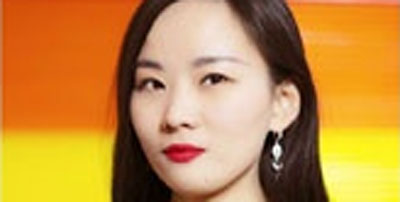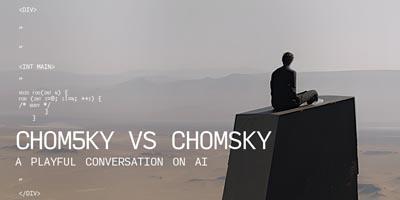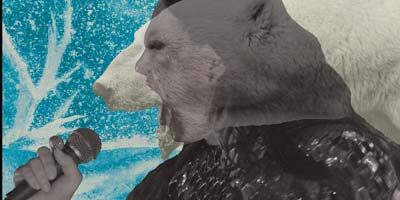The global LGBTQ+ community faces many complex and evolving challenges. While from an outside perspective it may seem as though the fight for equality has been won, there is still a long way to go. To understand these issues, I spoke with the UN Independent Expert on violence and discrimination based on sexual orientation and gender identity, Victor Madrigal-Borloz, to understand the major global problems facing the worldwide LGBTQ+ community. Appointed as the independent expert in 2017, he is a senior visiting researcher at Harvard’s Law School’s Human Rights Program.
“There are three global challenges,” Madrigal-Borloz told me. “The first one is the scourge of criminalization of LGBTQ+ people. Sixty-nine countries criminalize same-sex marriage. No one knows how many LGBT people exist in the world, but based on research, I go with the figure that 5-10% of the population are. That means, in those environments, 100 to 200 million people are being made criminals for who they are, who they love and desire.”
The second global challenge, he says, is “conversion therapy” – practices that seek to change a person’s sexual orientation or gender identity, despite the harm that is often the result. In his role as a UN independent expert, he issued a report and global call for ending the practices, saying it is still pervasive around the world.
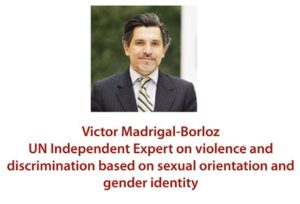 “I have an expression,” he said. “At the origin of violence and discrimination lay the protection of a system that is deeply rooted in the binary and in the idea that certain genital configurations correspond to certain functions in society.” The defense of this binary, heteronormative system creates stigma in three ways, which he calls “the infamous triad of crime, sin, and illness.”
“I have an expression,” he said. “At the origin of violence and discrimination lay the protection of a system that is deeply rooted in the binary and in the idea that certain genital configurations correspond to certain functions in society.” The defense of this binary, heteronormative system creates stigma in three ways, which he calls “the infamous triad of crime, sin, and illness.”
These three mechanics that portray diversity as criminal, sinful, and pathological are the essential instruments of the stakeholders in the current societal order. This defense created through our binary system has “carved deep grooved in social consciousness,” Madrigal-Borloz says.
“All of this is cast into an intricate intersectional system of prejudice and hatred that utilize these mechanisms to create notions of ‘otherness.’ And there is no country that is exempt from that, no matter how advanced you may be in legislations. You still have those deeply carved grooves.”
The Fight for LGBTQ+ Rights in Beijing
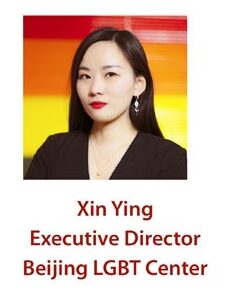 Xin Ying, popularly known as Iron, is the executive director of the Beijing LGBT Center. Iron identifies as a pansexual woman and has been working at the center for eight years. She spoke with me about the current issues in Beijing surrounding LGBTQ+ rights and what her center is striving to accomplish.
Xin Ying, popularly known as Iron, is the executive director of the Beijing LGBT Center. Iron identifies as a pansexual woman and has been working at the center for eight years. She spoke with me about the current issues in Beijing surrounding LGBTQ+ rights and what her center is striving to accomplish.
“Ours is the first and the biggest LGBT center in China,” she said. “We are playing a leading role in LGBT mental health, transgender support systems and workplace diversity and inclusion.” Along with community engagement, the organization’s advocacy is informed by the research and the surveys that they send out to the wider Beijing LGBTQ+ population to collect data and produce evidence what has identified the prevalent, deep-seated issues affecting the LGBTQ+ community.
“According to a survey that we conducted in 2016, only 5% of LGBTQ+ people in China are completely out, due to the social discrimination, Iron said. “Another survey about the mental health situation told us that LGBTQ+ people suffer a high risk of depression, triple that of heterosexual people. And 14% of psychologists in China believe that they can provide conversion therapy to the LGBTQ+ community.” She said that the most vulnerable group is the transgender community, she said, with 60% of transgender people suffering from mental health issues.
“Our organization really focuses on research because we believe that research can change people’s mind, and stories can change people’s hearts.”
Alongside the community-based issues, there are legal obstacles for LGBTQ+ organizations in China, Iron said. “As an LGBTQ+ organization, it is really hard to register as an NGO, so we work as a business a lot of the time, or we don’t have a legal identity. So, this brings another problem – the money. Since 2016, our government made it illegal to get funding from international entities that do not have a legal identity in China.”
Ways Forward
While there are global and local challenges that are facing the LGBTQ+ community, there are many organizations around the world that are fighting for a better society. Astraea is a public foundation that receives grants and redistributes that grant money to LGBTQ+ organizations around the world.
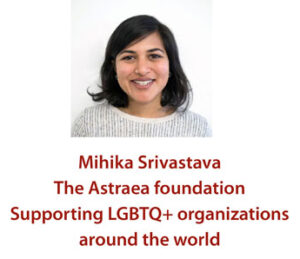 Mihika Srivastava, the communication program officer at Astraea, told me that the foundation’s focus is on grassroots mobilization. “The reason that we exist and do what we do is because we believe in working with the grassroots, and providing funding right at the grassroots, to support the building of movements.” Astrea doesn’t have an endowment and relies on public support. “We raise every dollar we spend. We recall value whether an individual donor gives five or five million dollars. They are part of our community.”
Mihika Srivastava, the communication program officer at Astraea, told me that the foundation’s focus is on grassroots mobilization. “The reason that we exist and do what we do is because we believe in working with the grassroots, and providing funding right at the grassroots, to support the building of movements.” Astrea doesn’t have an endowment and relies on public support. “We raise every dollar we spend. We recall value whether an individual donor gives five or five million dollars. They are part of our community.”
At the Beijing LGBT Center, they are training LGBTQ+ counsellors and nearly two thousand psychologists in China. Iron is proud that the center initiated the first ever transgender national hotline in China; it works seven days a week. The center also offers many community events for the local LGBTQ+ community. “This year we are trying to do more work around art,” she said, and described their recent open event floor highlighting the transgender community.
The Independent Expert on Sexual Orientation and Gender Identity has high hopes for the future of LGBTQ+ rights. “It would be unrealistic to believe that we are just going to snap our fingers and the whole notion of how the world is organized is going to change. What I am wishing for is the possibility to actually create spaces of questioning.” For example, why is it that facial recognition technology allows a person to be distinguished from all others on earth but we still have to identify our gender on the binary scale to identify ourselves?
“I was born a gay man, in a situation where I was born a criminal, born sick, born a sinner. Throughout my life, I have seen the process of change that has come due to the activism of the people that I am standing on the shoulders of. Having that life experience, where I have seen around me how change happens, allows me to have great optimism for the future.”

